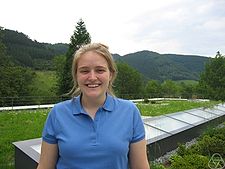Melanie Wood
Melanie Wood | |
|---|---|
 Melanie Wood in 2007 Photo from Mathematisches Forschungsinstitut Oberwolfach (MFO) | |
| Born | 1981 (age 43–44) |
| Nationality | American |
| Alma mater | Park Tudor School Duke University University of Cambridge, Trinity College Princeton University |
| Awards | Morgan Prize (2004) NSF CAREER Award (2017) |
| Scientific career | |
| Fields | Mathematics |
| Institutions | Stanford University University of Wisconsin University of California, Berkeley Harvard University |
| Thesis | Moduli spaces for rings and ideals (2009) |
| Doctoral advisor | Manjul Bhargava |
Melanie Matchett Wood (born 1981[1]) is an American mathematician at Harvard University[2] who was the first woman to qualify for the U.S. International Mathematical Olympiad Team. She completed her Ph.D. in 2009 at Princeton University (under Manjul Bhargava) and is currently Professor of Mathematics at Harvard University, after being Chancellor's Professor of Mathematics at UC Berkeley and Vilas Distinguished Achievement Professor of Mathematics at the University of Wisconsin, and spending 2 years as Szegö Assistant Professor at Stanford University.
Wood was born in Indianapolis, Indiana, to Sherry Eggers and Archie Wood, both middle school teachers. Her father, a mathematics teacher, died of cancer when Wood was six weeks old.[3]
While a high school student at Park Tudor School in Indianapolis, Wood (then aged 16) became the first, and until 2004 the only female American to make the U.S. International Mathematical Olympiad Team, receiving silver medals in the 1998 and 1999 International Mathematical Olympiad.[4] Wood was also a cheerleader and student newspaper editor at her school.[5]
In 2002, she received the Alice T. Schafer Prize from the Association for Women in Mathematics.
In 2003, Wood graduated from Duke University where she won a Gates Cambridge Scholarship, Fulbright fellowship, and a National Science Foundation graduate fellowship, in addition to becoming the first American woman and second woman overall to be named a Putnam Fellow in 2002.[6][7][8] During the 2003–2004 year she studied at Cambridge University. She was also named the Deputy Leader of the U.S. team that finished second overall at the 2005 International Mathematical Olympiad.[9]
In 2004, she won the Morgan Prize for work in two topics, Belyi-extending maps and P-orderings, making her the first woman to win this award.[4][8]
In 2012, she became a fellow of the American Mathematical Society.[10]
In 2017, she received an NSF Career Award.
In 2018, she received the AWM-Microsoft Research Prize in Algebra and Number Theory from the Association for Women in Mathematics.[11]
Selected publications
- Wood, Melanie (2019). "Nonabelian Cohen-Lenstra moments. With an appendix by the author and Philip Matchett Wood". Duke Math. J. 168, no. 3, 377–427. MR 3909900.
- Vakil, Ravi; Wood, Melanie (2015). "Discriminants in the Grothendieck ring". Duke Math. J. 164, no. 6, 1139–1185. MR 3336842.
- Wood, Melanie (2011). "Gauss composition over an arbitrary base". Adv. Math. 226, no. 2, 1756–1771. MR 2737799.
- Wood, Melanie (2010). "On the probabilities of local behaviors in abelian field extensions". Compos. Math. 146, no. 1, 102–128. MR 2581243
- Wood, Melanie (2003). "P-orderings: a metric viewpoint and the non-existence of simultaneous orderings". Journal of Number Theory. 99 (1): 36–56. doi:10.1016/S0022-314X(02)00056-2. MR 1957243.
References
- ^ "AWM Essay Contest: Leena Shah". Retrieved 11 November 2014.
- ^ "Melanie Matchett Wood" (PDF). math.berkeley.edu. Retrieved 2019-07-27.
- ^ Olson, Steven (2005). Count Down: Six Kids Vie for Glory at the World's Toughest Math Competition. Houghton Mifflin Harcourt. p. 18. ISBN 0-618-56212-5.
- ^ a b "Melanie Wood Interview". Retrieved 11 November 2014.
- ^ Rimer, Sara (2008-10-10). "Math Skills Suffer in U.S., Study Finds". New York Times. Retrieved 2008-10-10.
- ^ "Duke Magazine-Where Are They Now?-January/February 2010". Retrieved 11 November 2014.
- ^ "Archived copy". Archived from the original on 2010-07-07. Retrieved 2014-02-10.
{{cite web}}: CS1 maint: archived copy as title (link) - ^ a b https://www.ams.org/notices/200404/comm-morgan.pdf
- ^ "2005 IMO US Team Results | Mathematical Association of America". www.maa.org. Retrieved 2020-10-27.
- ^ List of Fellows of the American Mathematical Society, retrieved 2013-09-01.
- ^ "AWM-Microsoft Research Prize in Algebra and Number Theory 2018". Association for Women in Mathematics. Retrieved 26 January 2019.
External links
- An Interview with Melanie Matchett Wood (The Girls' Angle Bulletin)
- A Conversation with Melanie Wood (Math Horizons magazine)
- The Girl Who Loved Math (Discover magazine)
- Melanie Wood: The Making of a Mathematician (Duke University profile)
- [1] (homepage at the University of California, Berkeley)
- Rimer, Sara (October 10, 2008). "Math Skills Suffer in U.S., Study Finds". New York Times.
- Melanie Wood at the Mathematics Genealogy Project
- Melanie Wood's results at International Mathematical Olympiad
- 1981 births
- Living people
- People from Indianapolis
- Duke University alumni
- Princeton University alumni
- Putnam Fellows
- 21st-century mathematicians
- Stanford University Department of Mathematics faculty
- Fellows of the American Mathematical Society
- International Mathematical Olympiad participants
- 21st-century women mathematicians
- Park Tudor School alumni
